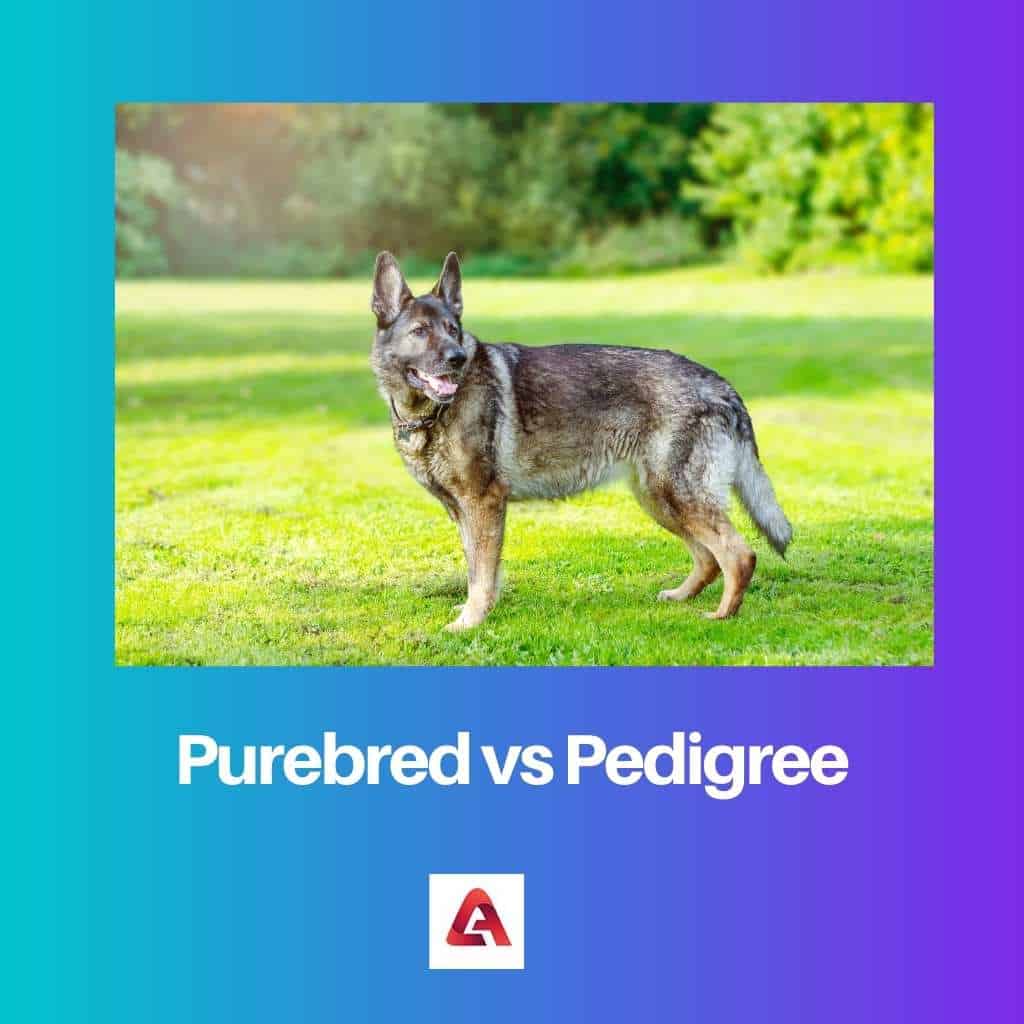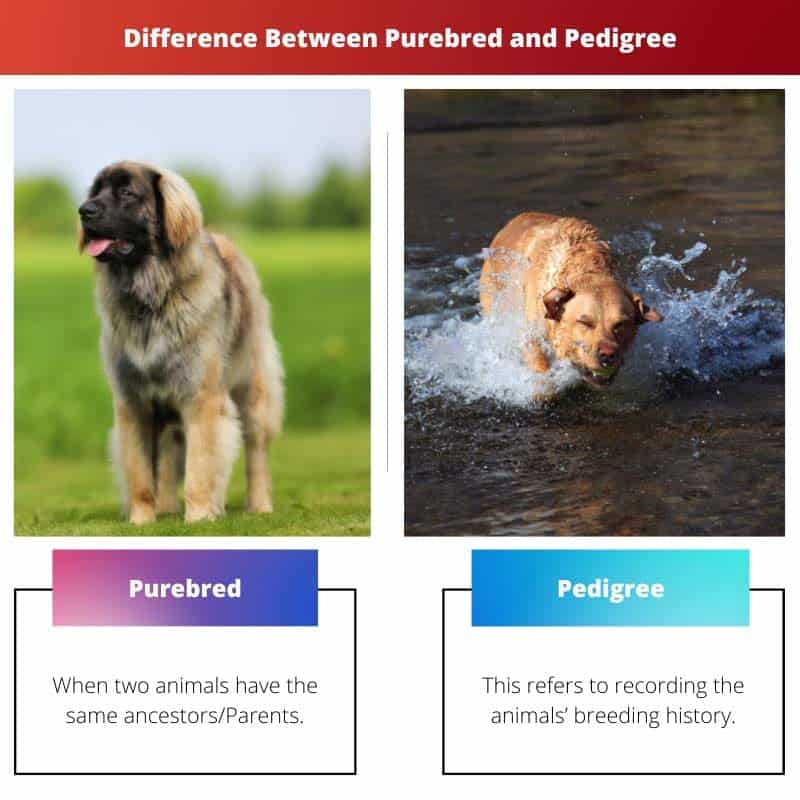A pet is a long-term commitment for everyone like having a baby of your own to which you have to give your best. And when it comes to adopting one, you need to consider all those factors that go into making a good decision for you and your pet.
Although both purebred and pedigree breeds are great additions to the family but there are some differences when it comes to the adoption of a purebred or a pedigree.
Key Takeaways
- A purebred dog is one whose parents belong to the same breed, while a pedigree dog has a documented ancestry proving its purebred status.
- Purebred dogs are bred to maintain specific breed standards, while pedigree dogs also focus on maintaining lineage records to ensure purity and traceability.
- Pedigree dogs are registered with official breed organizations, while purebred dogs may not have official registration or documentation.
Purebred vs Pedigree
Purebred refers to an animal that comes from a specific breed and has parents of the same breed. Pedigree refers to a record of an animal’s ancestors, going back several generations. Purebred animals are bred for specific traits, while pedigree provides animal lineage data.

Dog breeders who care about their dogs breed them with desirable traits and appearance. These breeding programs produce predictable offspring that display predictable traits in appearance, strength and instinct. When mated, purebred dogs always produce healthy offspring.
Pedigreed animals are the offspring of two animals which belong to the same breed or race and are registered within a society or an organisation that holds an animal registry. Many animals like dogs, cats, horses etc can be registered under a number of pedigree programmes.
The only reason to register animals under a pedigree scheme is to store their ancestorial records safely. The most popular of such organisation is the Kennel Club (for dogs).
Comparison Table
| Parameters | Pedigree | Purebred |
|---|---|---|
| Definition | When two animals have the same ancestors/Parents. | This refers to recording the animals’ breeding history. |
| Usage | The term describes the parents of the animal. | The term describes the ancestorial background of the animal. |
| Importance | Comes with desired behaviours and instincts. | Scientists looking for the genetic basis of physical traits and behaviours have a golden opportunity to study purebred dogs |
| Examples | Saint Bernard, pug, Rottweiler, Siberian husky, dalmatian, shih tzu, Doberman | Every dog or animal that has proper documentation of his/her ancestorial records |
What is Purebred?
The term Purebred designates to the offspring of the same breed i.e., both the parents belong to the same breed or race. However, this term means more than what is implied.
It is essential to note that purebred animals are created through selective breeding of the same kind or race and are therefore deliberate breeds.
True breeding is the artistry for any offspring of two same breeds to exhibit consistent, reproducible, and predictable characteristics when born.
For example, if two purebred horses of the same breed are crossed, the offspring will display the traits of the parents but not those of the parents’ ancestors. These traits can be anything like a ‘strong muscular body’ or ‘shiny fur’ or the ‘height’.
Normally, purebred refers to pets such as dogs, cats, horses, as well as cattle animals such as cows, sheep and goats, and pigs. Now talking about dogs, purebred is the purest form of the breed.
Furthermore, purebred dogs are different from mixed breeds and crossbreeds. In crossbreeding, two purebreds are intentionally crossbred to make a baby.
In contrast to the crossbreds, mixed breeds come from multiple lines of the same species, without any human intervention, selection, or record keeping. For examples – stray dogs or cats.

What is Pedigree?
In the sector of biology, a pedigree is an abstract picture of a family tree showing how a trait or disease has been inherited from one generation to the next. This could be anything from a crippling long cancer or a lung disease.
The study also reveals how family members relate to each other in terms of behaviour and physical appearance and also which family members express the trait in question or carry it silently.
Therefore, pedigrees provide a better insight into a family’s genetic background and helps scientist know them better.
Basically, if an animal has a pedigree, it means its ancestorial records have been recorded in the past. This ancestorial information is kept in a registry . this registry is also called as breeding registry.
Each recorded animal is given a certificate – referred to as a pedigree – by these registries. A certificate for an animal may simply list its ancestors, but it may also include a lineage chart showing the animal’s lineage.
An animal lineage is a sequence that tells us about the animals’ ancestry-descents that who all are the great grands of that particular animal.
The reason why pedigree dogs tend to be purebreds is that a pedigree dog must be descended from paternal pedigree parents. The dog must be a purebred to be eligible for pedigree inscriptions because its almost impossible to have a pedigree done on mixed breeds because their large family tree.

Main Differences Between Purebred and Pedigree
- Pedigrees describe the animals’ breeding history, while purebreds are from the same breed as their parents thus, they’re pure.
- Pedigree describes the genetic composition of the animal as a whole, while purebred describes the parents of the animal.
- If an animal is a pedigree doesn’t always mean that it’s a purebred because sometimes a purebred doesn’t have proper documentation.
- Every animal that has a pedigree is a purebred
- They also share some similarities like both the terms are used to describe the parental generation and some parental characteristics. Usually, both the terms are interchangeable as almost animal has a proper documentation (excluding stray animals and fake animal seller).

- https://gsejournal.biomedcentral.com/articles/10.1186/1297-9686-45-11
- https://journal.interbull.org/index.php/ib/article/view/328/328
